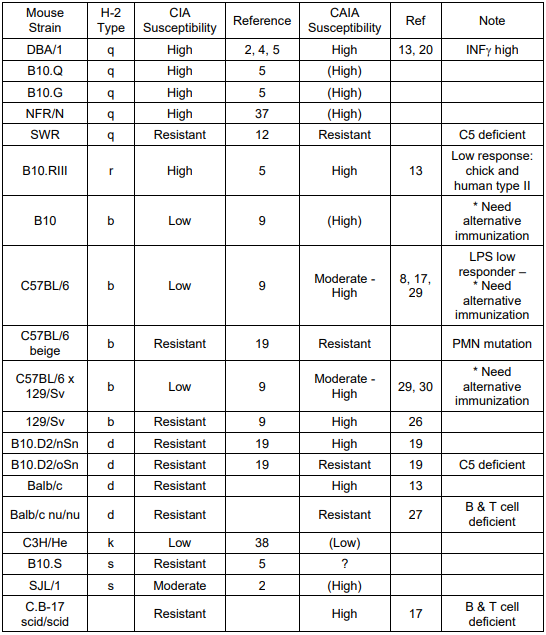Animal Care and Diet
动物饲养条件和饮食
建立CAIA模型需要选择7-8周龄小鼠。老龄鼠的发病率和病情严重程度较低。建议在无特定病原体(SPF级别)条件下饲养动物,因为细菌感染会降低宿主的免疫应答,从而减轻关节炎症。肠道菌群会影响宿主免疫系统对LPS 的易感性。LPS甚至会引起某些对LPS超级易感品系的小鼠致死。Chondrex公司建议在开展实验前先测试实验用小鼠对LPS的易感性。尽管饮食影响可以不用考虑,但是Chondrex公司建议饲喂高脂肪食物,研究表明高脂肪食物更容易引发炎症 (4)。
Mouse Strains
小鼠品系
注射抗二型胶原单克隆抗体合剂可以绕过宿主生成抗二型胶原自身抗体的需求,所以可以诱发MHC (例如H-2q和H-2r)缺陷的小鼠产生关节炎.所有能产生正常炎症反应和补体激活的小鼠品系都应该对CAIA敏感。
图一为目前为止测试过的小鼠品系。
DBA/1 (H-2q) and B10.RIII (H-2r) 小鼠对CIA和CAIA均有较高的敏感性(13)。
BALB/c (H-2d) 小鼠对CIA具有抗性,但对CAIA有较高敏感性,是目前最常用的品系(25-27)。
T细胞缺陷的C.B-17 scid/scid 小鼠可用于CAIA,因为在炎症发生的过程中,不需要T细胞识别抗原来产生抗体(17)。这中品系小鼠相比正常T细胞的小鼠,会产生更严重的关节炎症, T细胞在愈合过程中有调节炎症的作用。
SWR(H-2q)小鼠具有CIA易感基因型,但由于C5缺陷,对CIA 和CAIA具有抗性。 其他C5缺陷小鼠,例如B10.D2/oSn 和 NOD/LtSz scid/scid 对 CAIA 具 有 抗 性(12,19,27).
尽管裸大鼠对CAIA具有高易感性, 裸小鼠对CAIA具有抗性(29)。裸小鼠可能缺乏特定的促炎细胞因子的表达。
图一-用于胶原 CIA 及 胶原蛋白抗体诱导(CAIA )的关节炎动物模型研究的常用小鼠品系

*需要含结核杆菌的CFA佐剂诱导关节炎
C57BL/6小鼠是转基因小鼠模型中最常用的品系。尽管C57BL/6小鼠对LPS不敏感,但CAIA联合LPS 会使这些小鼠产生严重的关节炎症。在这种品系的小鼠中建模需要使用高剂量单克隆抗体合剂,每只小鼠需要5mg(21,30).C57BL/6 与129/Sy小鼠杂交用于建立基因敲除小鼠。一些杂交小鼠会对LPS有应答,所以1.5mg每只小鼠的剂量一会产生严重的关节炎症(30-31) 。
以下基因敲除小鼠用于基因对CAIA模的影响 (29-39).
1) NOS2 knockout mice (30)
2) Osteopontin knockout mice (31)
3) COX-1 and COX-2 knockout mice (32)
4) MMP-2 (gelatinase A) and MMP-3 (gelatinase B) knockout
mice (33)
5) P2X7 receptor knockout mice (34)
6) c-Jun N-Terminal Kinase knockout mice (35)
7) Prostaglandin E2 receptor knockout mice (36)
8) CD69 null mice (37)
相关文献:
4. P. Wooley, Collagen-induced arthritis in the mouse.Methods Enzymol 162, 361-373 (1988).
12. R. Reife, N. Loutis, W. Watson, K. Hasty, J. Stuart, SWR Mice Are Resistant to Collagen-Induced Arthritis but Produce Potentially Arthritogenic Antibodies. Arthritis Rheum. 34, 776-81(1991).
13. K. Terato, D. Harper, M. Griffiths, D. Hasty, X. Ye, et al.,Collagen-induced Arthritis in Mice: Synergistic Effect of E. Coli Lipopolysaccharide Bypasses Epitope Specificity in the Induction of Arthritis With Monoclonal Antibodies to Type II Collagen.Autoimmunity 22, 137-47 (1995).
17. T. Kagari, H. Doi and T. Shimozato. The importance of IL-1β and TNF-α, and the noninvolvement of IL-6, in the development of monoclonal antibody-induced arthritis. J Immunol 169,1459-1466 (2002).
19. W. Watson, P. Brown, J. Pitcock, A. Townes, Passive Transfer Studies With Type II Collagen Antibody in B10.D2/old and New Line and C57Bl/6 Normal and Beige (Chediak-Higashi) Strains: Evidence of Important Roles for C5 and Multiple Inflammatory Cell Types in the Development of Erosive Arthritis.Arthritis Rheum. 30, 460-5 (1987).
25. P. M. Wallace, J. F. MacMaster, K. A. Rouleau, T. J. Brown,J. K. Loy, et al., Regulation of Inflammatory Responses by Oncostatin M. J Immunol. 162, 5547-55 (1999).
26. R. de Fougerolles, A. G. Sprague, C. L. Nickerson-Nutter,G. Chi-Rosso, P. D. Rennert, et al., Regulation of Inflammation by Collagen-Binding Integrins alpha1beta1 and alpha2beta1 in
Models of Hypersensitivity and Arthritis. J Clin Invest. 105, 721-9(2000).
27. S Larox, J. Fuseler, D. Merril, L. Gray, R. Reife, K. Terato,et al. #301 A novel model of polyarthritis induced in mice using monoclonal antibodies to type II collagen. Characterization and
effects of chemically modified tetracycline. Arthritis Rheum 42:s121 (supplement).
29. K. Takagishi, N. Kaibara, T. Hotokebuchi, C. Arita, M.Morinaga, K. Arai, et al., Serum Transfer of Collagen Arthritis in Congenitally Athymic Nude Rats. J Immunol. 134, 3864-7 (1985).
30. H. Kato, K. Nishida, A. Yoshida, I. Takada, C. McCown, et al., Effect of NOS2 Gene Deficiency on the Development of Autoantibody Mediated Arthritis and Subsequent Articular Cartilage Degeneration. J Rheumatol. 30, 247-55 (2003).
31. K. Yumoto, M. Ishijima, S. Rittling, K. Tsuji, Y. Tsuchiya, et al., Osteopontin Deficiency Protects Joints Against Destruction in Anti-Type II Collagen Antibody-Induced Arthritis in Mice. Proc Natl Acad Sci U S A 99, 4556-61 (2002).
32. L. Myers, A. Kang, A. Postlethwaite, E. Rosloniec, S. Morham, et al., The Genetic Ablation of Cyclooxygenase 2 Prevents the Development of Autoimmune Arthritis. Arthritis Rheum 43, 2687-93 (2000).
33. T. Itoh, H. Matsuda, M. Tanioka, K. Kuwabara, S. Itohara, R. Suzuki, et al., The Role of Matrix metalloproteinase-2 and Matrix metalloproteinase-9 in Antibody-Induced Arthritis. J Immunol 169, 2643-7 (2002).
34. J. Labasi, N. Petrushova, C. Donovan, S. McCurdy, P. Lira,et al., Absence of the P2X7 Receptor Alters Leukocyte Function and Attenuates an Inflammatory Response. J Immunol 168,6436-45 (2002).
35. Z. Han, L. Chang, Y. Yamanishi, M. Karin, G. Firestein, Joint Damage and Inflammation in c-Jun N-terminal Kinase 2 Knockout Mice With Passive Murine Collagen-Induced Arthritis. Arthritis Rheum 46, 818-23 (2002).
36. J. McCoy, J. Wicks, L. Audoly, The Role of Prostaglandin E2 Receptors in the Pathogenesis of Rheumatoid Arthritis. J Clin Invest 110, 651-8 (2002).
37. R. Newton, K. Solomon, M. Covington, C. Decicco, P. Haley, et al., Biology of TACE Inhibition. Ann Rheum Dis 60 Suppl 3, 25-32 (2001).
38. R. Holmdahl, L. Jansson, M. Andersson, E. Larsson,Immunogenetics of Type II Collagen Autoimmunity and
Susceptibility to Collagen Arthritis. Immunology. 65, 305-10(1988).
39. S. Thornton, G. Boivin, K. Kim, F. Finkelman, R. Hirsch, Heterogeneous Effects of IL-2 on Collagen-Induced Arthritis. J Immunol 165, 1557-63 (2000).
更多资料或相关产品,请联系Chondrex全国授权代理-欣博盛生物
全国服务热线: 4006-800-892 邮箱: market@neobioscience.com
深圳: 0755-26755892 北京: 010-88594029
广州:020-87615159 上海: 021-34613729
代理品牌网站: www.neobioscience.com
自主品牌网站: www.neobioscience.net
